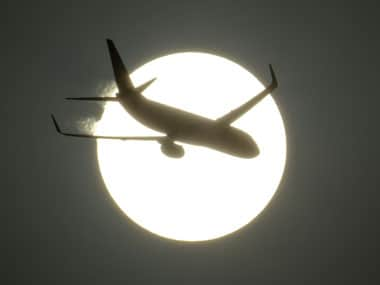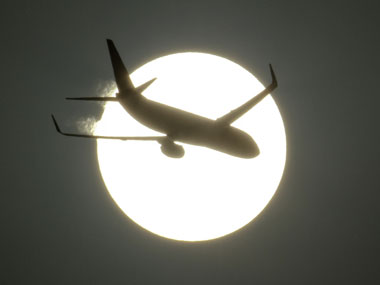New Delhi: The ridiculous 5/20 rule which places restrictions on new airlines for flying abroad is being lifted. But the government wants to protect existing airlines and has quietly inserted a proposal which bars new carriers from international flights of less than six hours initially. This means the lucrative Gulf routes besides Singapore, Hong Kong, Bangkok may be out of the purview of new airlines Vistara and AirAsia India initially.[caption id=“attachment_2116647” align=“alignleft” width=“380”]
 New aviation laws. Reuters[/caption] The entire process that the Ministry of Civil Aviation has followed in trying to lift the 5/20 rule is riddled with confusion and reeks of bad planning. This latest proposal is nothing but protectionism for airlines like IndiGo, Jet Airways, SpiceJet and Air India. It is a bad idea. Why scrap the 5/20 restriction only to replace it with more restrictions for airlines wanting to fly overseas? On the one hand, the government speaks of ease of doing business and has set itself an ambitious tourism target. On the other, it is once again trying to restrict new airlines from spreading their wings - which can only mean foreign airlines continue to thrive as Indian carriers get stifled under protectionist rules. Lets start at the beginning. When the Ministry of Civil Aviation initially proposed abolition of the 5/20 rule, it linked overseas flights by new and existing airlines to the number of connections they provide to remote and regional areas. This itself is silly - why should an airline wanting to fly overseas or increase flights overseas be tied down to domestic connectivity? The two issues should have remained separate, as in the past. Then, the ministry proposed a very complicated mechanism to allow airlines overseas flights - a formula based on number of seats being offered to a particular destination (say the North East) and how much of an airline’s total capacity is offered on such routes. The proposal, as we said earlier, was anyway complicated. It was opposed by existing airlines, all of whom said that since they had to wait five years and expand fleet to 20 aircraft before being allowed to fly overseas, why should new airlines have it any easier? Now, the ministry has introduced further complications by proposing that domestic flying credits (DFCs) which airlines can earn through increased remote area connectivity be based on number of occupied seats on an aircraft instead of total number of seats on such an aircraft. Basically, this makes it harder for both, existing and new airlines to earn these crucial DFCs. So a bad idea to begin with has been made worse. A senior official in the Ministry of Civil Aviation said today that new airlines will have to earn double the domestic credits to fly to destinations within six hours. For destinations over six hours, they need to earn 300 DFCs while for those less than six hours, they need to earn 600 credits. Not only does this keep lucrative routes out of Vistara and AirAsia’s plans initially, this could also mean the two airlines have to tweak their fleet strategy and buy wide body aircraft to fly to long haul routes in the US, Australia, UK. CAPA’s Kapil Kaul said he was “extremely” disappointed with the ministry’s new proposal, which was very confusing, made regulation more complex and significantly increased barriers to market access for the recently launched new Indian carriers. “Someone is advising the government wrongly. With the new rule, gap in bilateral utilization between India and foreign airlines will continue to be significant which will impact overall policy on market access issues. Also, it will be difficult for government to further liberalize the bilateral regime,” Kaul said. An official representing FIA, the lobby group of existing airlines, said airlines have sought another meeting with the ministry officials after new clauses like over 6 hour flights and new methods to calculate DFCs were proposed in today’s meeting. He said another meeting is likely in two weeks on the same issue. Separately, a senior ministry official said inter-ministerial consultations on the new proposals have begun and that a cabinet note will be sent on scrapping 5/20 by April first week. The 5/20 rule bars an airline from flying overseas unless it has completed five years of domestic operations and has a fleet of 20 aircraft.
New aviation laws. Reuters[/caption] The entire process that the Ministry of Civil Aviation has followed in trying to lift the 5/20 rule is riddled with confusion and reeks of bad planning. This latest proposal is nothing but protectionism for airlines like IndiGo, Jet Airways, SpiceJet and Air India. It is a bad idea. Why scrap the 5/20 restriction only to replace it with more restrictions for airlines wanting to fly overseas? On the one hand, the government speaks of ease of doing business and has set itself an ambitious tourism target. On the other, it is once again trying to restrict new airlines from spreading their wings - which can only mean foreign airlines continue to thrive as Indian carriers get stifled under protectionist rules. Lets start at the beginning. When the Ministry of Civil Aviation initially proposed abolition of the 5/20 rule, it linked overseas flights by new and existing airlines to the number of connections they provide to remote and regional areas. This itself is silly - why should an airline wanting to fly overseas or increase flights overseas be tied down to domestic connectivity? The two issues should have remained separate, as in the past. Then, the ministry proposed a very complicated mechanism to allow airlines overseas flights - a formula based on number of seats being offered to a particular destination (say the North East) and how much of an airline’s total capacity is offered on such routes. The proposal, as we said earlier, was anyway complicated. It was opposed by existing airlines, all of whom said that since they had to wait five years and expand fleet to 20 aircraft before being allowed to fly overseas, why should new airlines have it any easier? Now, the ministry has introduced further complications by proposing that domestic flying credits (DFCs) which airlines can earn through increased remote area connectivity be based on number of occupied seats on an aircraft instead of total number of seats on such an aircraft. Basically, this makes it harder for both, existing and new airlines to earn these crucial DFCs. So a bad idea to begin with has been made worse. A senior official in the Ministry of Civil Aviation said today that new airlines will have to earn double the domestic credits to fly to destinations within six hours. For destinations over six hours, they need to earn 300 DFCs while for those less than six hours, they need to earn 600 credits. Not only does this keep lucrative routes out of Vistara and AirAsia’s plans initially, this could also mean the two airlines have to tweak their fleet strategy and buy wide body aircraft to fly to long haul routes in the US, Australia, UK. CAPA’s Kapil Kaul said he was “extremely” disappointed with the ministry’s new proposal, which was very confusing, made regulation more complex and significantly increased barriers to market access for the recently launched new Indian carriers. “Someone is advising the government wrongly. With the new rule, gap in bilateral utilization between India and foreign airlines will continue to be significant which will impact overall policy on market access issues. Also, it will be difficult for government to further liberalize the bilateral regime,” Kaul said. An official representing FIA, the lobby group of existing airlines, said airlines have sought another meeting with the ministry officials after new clauses like over 6 hour flights and new methods to calculate DFCs were proposed in today’s meeting. He said another meeting is likely in two weeks on the same issue. Separately, a senior ministry official said inter-ministerial consultations on the new proposals have begun and that a cabinet note will be sent on scrapping 5/20 by April first week. The 5/20 rule bars an airline from flying overseas unless it has completed five years of domestic operations and has a fleet of 20 aircraft.
Lifting 5/20: Why barring new airlines from Gulf routes is bad protectionism
Sindhu Bhattacharya
• March 18, 2015, 19:27:38 IST
The entire process that the Ministry of Civil Aviation has followed in trying to lift the 5/20 rule is riddled with confusion and reeks of bad planning.
Advertisement
)
End of Article